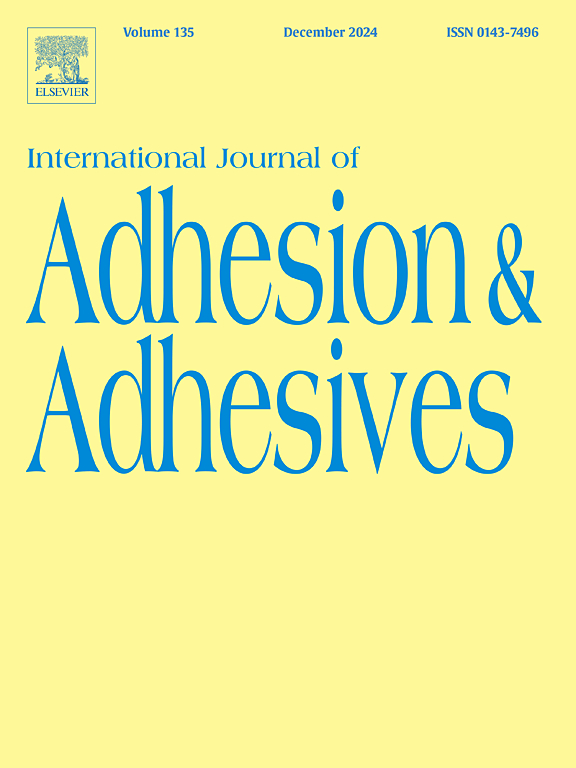Enhancing adhesion strength of protein-based adhesives through plywood heat treatment
IF 3.5
3区 材料科学
Q2 ENGINEERING, CHEMICAL
International Journal of Adhesion and Adhesives
Pub Date : 2025-04-09
DOI:10.1016/j.ijadhadh.2025.104029
引用次数: 0
Abstract
Heat treatment of wood in the absence of oxygen is widely used in industry to enhance raw wood properties, but cannot be broadly applied to engineered wood like plywood. Most synthetic adhesives, particularly formaldehyde-based ones, degrade at high-temperatures and release toxic substances, harming the environment. This study explored protein-based adhesives for heat-treated plywood, inspired by high-temperature, controlled oxygen or non-oxygen conditions in baking. Three adhesive formulations—soy flour (SF), polyamide-epichlorohydrin modified soy flour (PAE/SF), and urea formaldehyde (UF)—were used with yellow pine wood and heat-treated at 190–200 °C for 1–4 h. Untreated UF plywood demonstrated good dry and wet strength, but significant strength loss and complete delamination after heat treatment. Conversely, heat-treated SF plywood showed substantial improvements in wet strength, reaching 1.31 MPa at 190 °C for 2 h and 1.48 MPa at 200 °C for 1.5 h. PAE/SF plywood maintained high wet strength, peaking at 1.74 MPa at 190 °C for 1 h. The enhanced water resistance resulted from protein denaturation, loss of hydrophilic groups, and crosslinking during heat treatment. Maillard reactions further improved water resistance by forming covalent bonds and melanoidins. Heat treatment at 200 °C for 2 h also improved the dimensional stability of the plywood while maintaining acceptable bending and tensile strengths. This study highlights the potential of protein-based adhesives as an eco-friendly alternative for improving heat-treated plywood properties.
通过胶合板热处理,提高蛋白基胶粘剂的粘接强度
在工业中,在缺氧条件下对木材进行热处理,以提高木材的性能,但不能广泛应用于胶合板等工程木材。大多数合成粘合剂,特别是以甲醛为基础的粘合剂,在高温下会降解并释放有毒物质,危害环境。受高温、可控氧或无氧烘烤条件的启发,本研究探索了热处理胶合板的蛋白质基胶粘剂。将三种胶粘剂——大豆粉(SF)、聚酰胺-环氧氯丙烷改性大豆粉(PAE/SF)和脲醛(UF)——与黄松木一起使用,并在190-200℃下热处理1-4小时。未经处理的UF胶合板表现出良好的干湿强度,但热处理后强度损失明显,分层完全。相反,经过热处理的SF胶合板湿强度有了明显的提高,在190℃下保温2 h达到1.31 MPa,在200℃下保温1.5 h达到1.48 MPa。PAE/SF胶合板保持了较高的湿强度,在190℃下保温1 h达到峰值1.74 MPa。美拉德反应通过形成共价键和类黑素进一步提高了抗水性。在200°C下热处理2小时也提高了胶合板的尺寸稳定性,同时保持了可接受的弯曲和拉伸强度。这项研究强调了蛋白质基粘合剂作为改善热处理胶合板性能的环保替代品的潜力。
本文章由计算机程序翻译,如有差异,请以英文原文为准。
求助全文
约1分钟内获得全文
求助全文
来源期刊

International Journal of Adhesion and Adhesives
工程技术-材料科学:综合
CiteScore
6.90
自引率
8.80%
发文量
200
审稿时长
8.3 months
期刊介绍:
The International Journal of Adhesion and Adhesives draws together the many aspects of the science and technology of adhesive materials, from fundamental research and development work to industrial applications. Subject areas covered include: interfacial interactions, surface chemistry, methods of testing, accumulation of test data on physical and mechanical properties, environmental effects, new adhesive materials, sealants, design of bonded joints, and manufacturing technology.
 求助内容:
求助内容: 应助结果提醒方式:
应助结果提醒方式:


